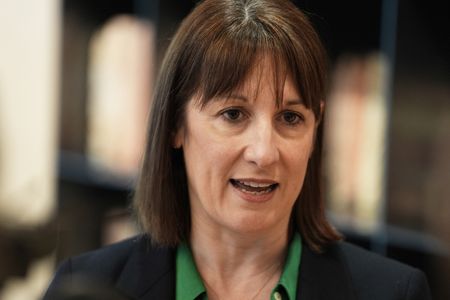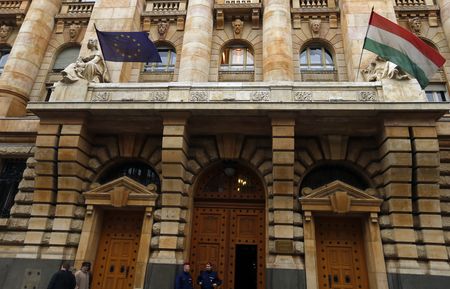By David Milliken
LONDON (Reuters) – British finance minister Rachel Reeves received more bad news on the public finances on Friday after January tax receipts came in lower than expected, barely a month before she gives an update on whether she is on course to meet her borrowing targets.
The public finances typically show a surplus in January when annual tax bills for the previous financial year fall due. But income tax and capital gains tax revenues were below expectations, the Office for National Statistics said.
Although January data showed a record 15.4 billion pound ($19.5 billion) surplus, this was below the 20.5 billion pounds pencilled in by the government’s Office for Budget Responsibility (OBR) and a similar estimate in a Reuters poll.
Cumulative borrowing for the first 10 months of the financial year totalled 118.2 billion pounds, the fourth-highest on record and well above the OBR’s 105.4 billion pound forecast.
The increased year-to-date total reflected an upward revision to past debt interest payments and a downward revision to corporation tax revenue as well as the lower-than-expected January surplus, the ONS said.
The figures come after a number of economists have estimated that Reeves risks missing her debt reduction goals when the OBR publishes updated borrowing forecasts on March 26.
Matt Swannell, chief economic advisor to the EY ITEM Club, a forecasting organisation, said Reeves was facing the prospect of having to tighten the public purse strings as soon as next month to meet her budget target.
“If the OBR’s updated assessment shows that existing headroom has been used up, then more fiscal consolidation through tax rises or spending cuts may have to be announced in March,” Swannell said.
Reeves’ first budget in October left her with only 9.9 billion pounds of headroom to meet a target of balancing day-to-day spending and tax revenues by the 2029-30 financial year, despite announcing Britain’s biggest tax rises in decades.
Since the budget, borrowing costs have risen globally and British business sentiment and growth prospects have weakened, reflecting Reeves’ 40 billion-pound tax rise and uncertainty created by trade tariffs announced by U.S. President Donald Trump.
After Friday’s data release, Reeves’ deputy, Chief Secretary to the Treasury Darren Jones, reiterated that the government “is committed to delivering economic stability and meeting our non-negotiable fiscal rules”.
Public sector net debt excluding public sector banks totalled 95.3% of annual gross domestic product in January, 0.1 percentage point higher than a year earlier and around levels last seen in the early 1960s, the ONS said.
Public sector net financial liabilities – a measure targeted by Reeves which includes illiquid assets – stood at 82.7% of GDP in January, up 2.0 percentage points on the year.
($1 = 0.7893 pounds)
(Reporting by David Milliken; Editing William Schomberg and Susan Fenton)











